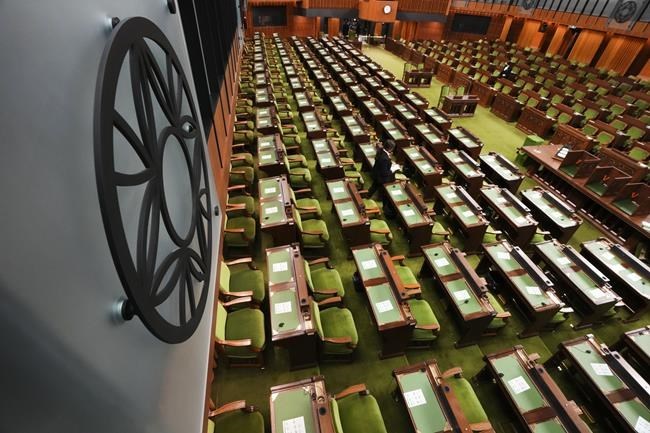OTTAWA — The lightning spread of the Omicron COVID-19 variant is prompting federal politicians to reconsider the wisdom of having several hundred MPs crammed together in the House of Commons.
Government House leader Mark Holland announced Tuesday that the Liberals will "greatly reduce" the number of their MPs in the chamber and intend to hold entirely virtual caucus meetings for the time being.
Liberals are following the advice of public health officials, who are warning Canadians that "now is not the time for mass gatherings and that smaller is better," Holland said, noting that the experience in other countries suggests the Omicron variant is as much as eight times more contagious than the Delta variant.
It's particularly important to limit gatherings of MPs who "are coming from all areas in the country and will be returning to all areas of the country," he added.
Holland met with his opposition counterparts to advise them of the Liberals' decision but said it's up to them to decide whether to follow suit.
A New Democrat official said thatparty's weekly caucus meeting Wednesday will be virtual and an update on the number of NDP MPs allowed in the House will come later in the day.
Bloc Quebecois spokesperson Julien Coulombe-Bonnafous said the Bloc's caucus will meet in person Wednesday, "respecting all the sanitary measures in force." He added that all MPs and staff who attend are fully vaccinated.
Beyond that, Coulombe-Bonnafous said the Bloc will "remain cautious and will adjust, as we have done since the start of the pandemic, depending on developments and public health recommendations."
Conservative whip Blake Richards said his caucus will also meet in person on Wednesday. He made no commitment to take any other steps, other than to say "As always, Conservatives will continue to abide by all current public health guidelines."
Both the Conservatives and the Bloc argued last month for a full return to normal, in-person operations of the House and its committees, complaining that the hybrid format used previously during the pandemic allowed cabinet ministers to escape opposition scrutiny.
Over Tory and Bloc objections, Liberals and New Democrats joined forces to approve a resumption of the hybrid format, giving MPs the option of participating virtually in proceedings.
Nevertheless, since the new parliamentary session opened three weeks ago, most of the country's 338 MPs have been showing up in the Commons in person. They are required to wear masks — which must be removed when an MP is voting — but the close seating arrangements make it impossible to maintain two metres of physical distance between MPs when the chamber is crowded.
As of Tuesday evening, Holland said the Liberals will allow only 25 to 30 MPs at any given time to be sitting on their side of the chamber, including what he called a "robust cabinet presence." The rest will participate remotely via video conference.
He argued that the emergence of the highly transmissible Omicron variant proves the wisdom of retaining the hybrid format.
"What is clear as we continue the fight against COVID-19 is that nothing is predictable," Holland said.
"One of the things that I said when we were pushing for the importance of hybrid provisions is that we have to remain flexible and adapt as the public health circumstance changes."
Holland said there may be more changes coming to adapt to the wildfire spread of the Omicron variant, including potentially requiring anyone entering the Commons precinct to have received a third booster shot, in addition to the current double vaccination requirement.
He did not rule out the possibility of extending Parliament's six-week holiday break if the Omicron wave of the pandemic gets much worse, as public health experts fear. The break is to begin Friday evening and is currently scheduled to continue until Jan. 31.
This report by The Canadian Press was first published Dec. 14, 2021.
Joan Bryden, The Canadian Press
Note to readers: Corrects name of Bloc Quebecois spokesperson



